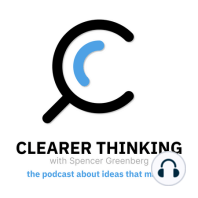58 min listen

Aesthetics and Polyamory with Sam Rosen
Aesthetics and Polyamory with Sam Rosen
ratings:
Length:
92 minutes
Released:
Oct 13, 2020
Format:
Podcast episode
Description
Read the full transcriptHow can we improve art museums? Does aesthetics need something equivalent to the effective altruism movement? What is steel-aliening? What are the most important social skills to learn, and how can we learn them? Can anybody become polyamorous? What does it take to succeed in a polyamorous relationships? Why do societies decay over time?Sam Rosen is a rationalist who has studied philosophy and has done psychology research. He writes a lot on his Facebook page. His artblog is called Opulent Joy. And his two favorite blog posts he's written are here and here. If you want to get in touch with Sam, message him on Facebook or email him at samuelblakerosen@gmail.com.
Released:
Oct 13, 2020
Format:
Podcast episode
Titles in the series (100)
Spencer Greenberg @ THINKERS Workshop by Clearer Thinking with Spencer Greenberg